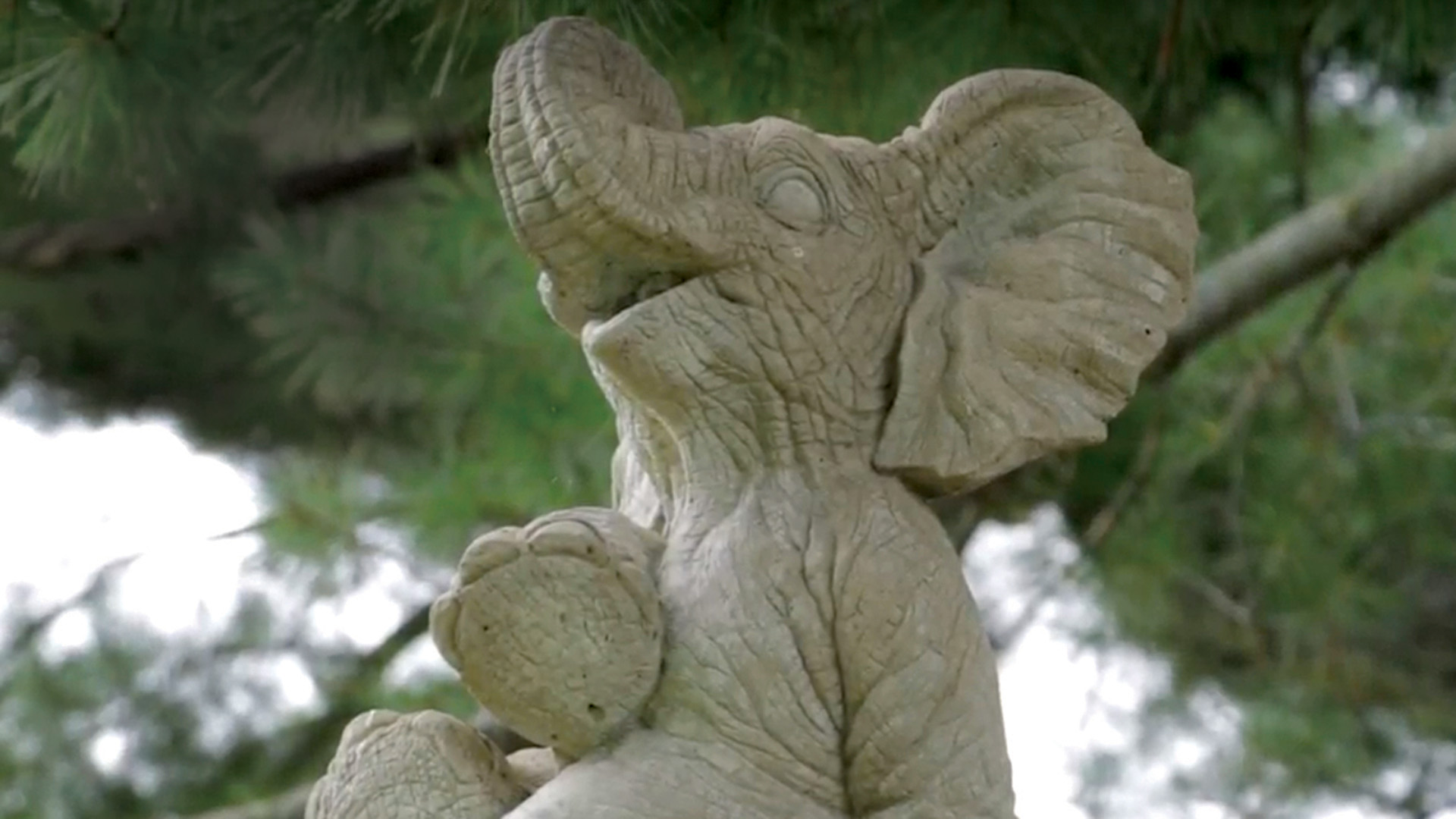But the three-ton elephant felled by a lightning bolt continues to make her mark in Oquawka to this very day
The village of Oquawka barely knew Norma Jean but will never forget her.
The circus elephant was in town less than a day when she was killed in a freak weather accident. Her unexpected demise left the small town with a curious quandary: What do you do with a 6,500-pound dead elephant?
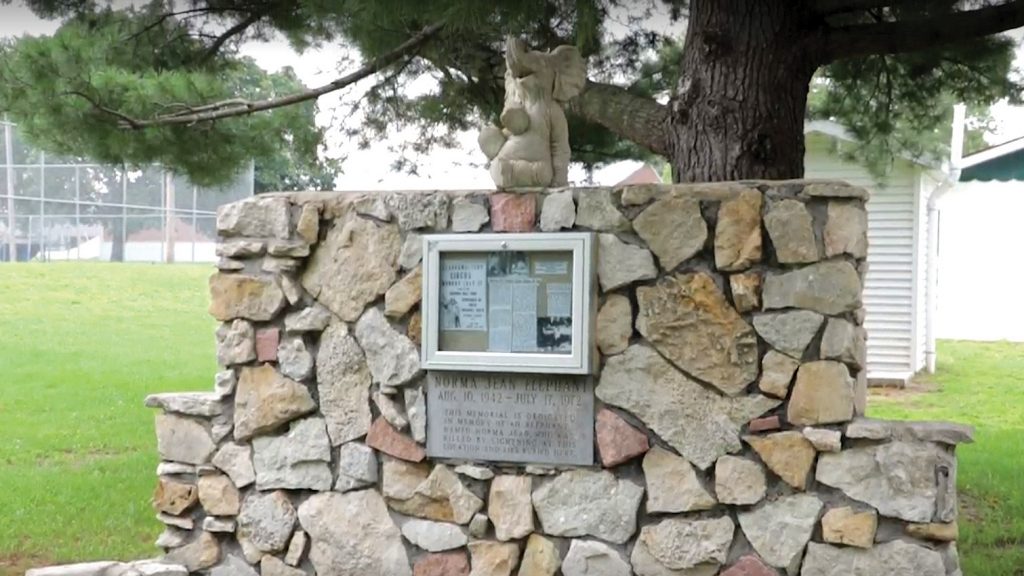
The answer: Create central Illinois’ only elephant graveyard. More than a half-century later, her memory is still honored, by the town as well as tourists.
“It means a lot,” said Susan Cochran, a volunteer for Oquawka Parks and Tourism. “You can’t believe the people that come to Oquawka just to see Norma Jean’s grave. It’s about the only tourism attraction, other than the river.”
The circus comes to town
Almost 70 miles west of Peoria, Oquawka enjoyed a 19th century heyday as a mill and shipping center along the Mississippi River. These days, with 1,400 residents, Oquawka survives as the seat of Henderson County. But its biggest moment, along with its biggest guest, arrived with an unexpected flash in 1972.
That July, Oquawka bubbled with excitement: The Clark & Walter Circus was coming. It was a big deal, especially to a small town decades before cable TV and the internet came along.
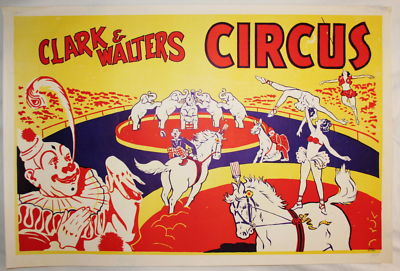

Clark & Walter Circus hoped to sell a lot of $1 tickets in Oquawka. At the time, circuses nationally had been losing popularity and attendance. For Clark & Walter, tough times meant selling off several elephants, except for one: a 29-year-old pachyderm named Norma Jean.
‘That was the talk of the town: what to do with the elephant’
— Brian Cochran
She was the star of the show. Known for her circus skills and gentle temperament, she was beloved by her fellow performers.
An approaching storm
The circus rolled into town the night of July 16, setting up in the town park, then just a grassy field. Roustabouts scurried to get tents up fast, ahead of forecasts calling for possible rain.
Norma Jean’s caretaker, known as Possum Red, was always careful to keep track of the elephant. A couple of years earlier, she had wandered away during a circus stopover in Indiana. So, in the Oquawka town park, he used a metal chain to tie her to a big, tall tree.
The next morn, storm clouds rolled in. Possum Red worried about possible lightning and that metal chain. So, he ducked out of his tent to cut Norma Jean loose.
“Just as he got to the tree, a big bolt of lightning struck the tree and knocked Possum Red 30 feet (away),” Cochran said. “When he finally came to, he looked at the tree and saw his beloved Norma Jean lying on the ground, dead.”
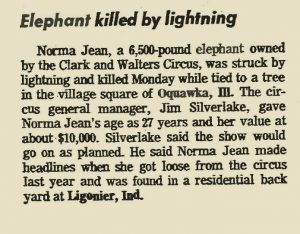
The circus family was stunned, in part out of grief. But they also worried about what would happen to the circus and their jobs without the star of the show — a $10,000 uninsured elephant.
“I think they hit the road pretty much right after that,” Cochran said.
A big, fat quandary
With the circus bugging out — and soon to go out of business — Oquawka was left with a problem that sounds like a silly riddle: What do you do with a 6,500-pound elephant carcass?
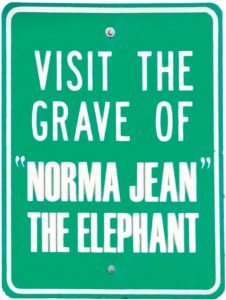
News crews from all over swarmed to Oquawka to cover the strange saga. Townsfolk, especially kids like 6-year-old Brian Cochran, came out to stare at the elephant and wonder about the next move.
“That was the talk of the town: what to do with the elephant,” Brian Cochran recalled 51 years later.
After contacting the state for direction and permission, the village used a backhoe to dig a 12-foot hole, then rolled Norma Jean into the makeshift grave.
At first, a plywood sign marked Norma Jean’s final resting spot. But some locals didn’t think a mere sign would do, not for something as remarkable and momentous as a fallen elephant.
So, they built a memorial wall with commemorative plaques. More than a half-century years later, tourists still trickle into Oquawka to glimpse the oddity of an elephant gravesite. They pause to remember the untimely death of a circus elephant that a small town barely knew — but will never forget.



